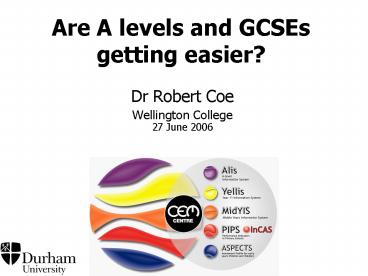Are A levels and GCSEs getting easier - PowerPoint PPT Presentation
1 / 17
Title:
Are A levels and GCSEs getting easier
Description:
Represent achievement of equal difficulty (intellectual demand) Are equally likely to ... Comparisons over time are problematic and should be treated cautiously ... – PowerPoint PPT presentation
Number of Views:56
Avg rating:3.0/5.0
Title: Are A levels and GCSEs getting easier
1
Are A levels and GCSEs getting easier?
- Dr Robert Coe
- Wellington College27 June 2006
2
Standards and comparability
- Grades in two examinations have the same standard
if they - Represent equal achievement
- Represent achievement of equal value
- Represent achievement of equal difficulty
(intellectual demand) - Are equally likely to be achieved
- Indicate equal levels of ability
3
Achievement at GCSE
4
Achievement at A level
5
Yellis
- Year 11 information system
- Began in 1994
- Baseline test of developed ability in Y10
- Value-added to GCSE
- 1200 schools
- www.yellisproject.org
6
Alis
- A level information system
- Began in 1983
- Baseline is GCSE or Test of Developed Ability
(TDA) - Value-added to A/AS level ( others)
- 1400 schools and colleges
- www.alisproject.org
7
GCSEs achieved by comparable students
8
A levels achieved by comparable students
9
Change over different times
10
Possible Explanations
- Teaching and learning have improved
- Examination performance has improved
- The same levels of knowledge and understanding
are easier to demonstrate - Demographic changes have facilitated better
performance - The reference tests used in this comparison are
inappropriate - The Alis and Yellis samples have changed
- Public examinations have changed too much to make
valid comparisons possible - The same grade represents a lower level of ability
11
Some subjects are easier than others
GCSEs
12
Growth of easier subjects (A level)
13
Summary
- Raw achievement has increased dramatically since
the late 1980s - At GCSE, students of comparable ability achieved
about half a grade higher in 2005 than in 1996 - At A level, the performance of students of
comparable ability has increased by an average of
1.3 grades since 1995 in maths it has increased
by 3.2 grades since 1988 - As well as individual subjects getting easier,
there has been a move towards the easier
subjects - If grades are interpreted as indicating general
academic ability, then they are worth less
14
Implications
- Comparisons over time are problematic and should
be treated cautiously - Teachers and students have worked hard and we
should not devalue their achievements - Getting easier may not be a bad thing for the
majority - For some groups (elite universities, very able
students), A levels are no longer fit for purpose
15
Some questions
- How do we challenge the most able students,
without disadvantaging them? - How can selectors discriminate at the top end?
- How do we keep A levels accessible for the
majority? - How can we reduce the incentives to take easier
subjects?
16
Possible solution?
- Stop pretending that all subjects are equally
hard - Encourage diversity of syllabuses
- Allow exam boards to award grades using judgement
and expertise, underpinned by statistical
analysis - Calculate UCAS points and league tables using
difficulty corrected points - Better still, abandon league tables altogether
17
Dr Robert CoeDirector of Secondary
ProjectsCurriculum, Evaluation and Management
(CEM) CentreUniversity of DurhamMountjoy
Research Centre 4Stockton RoadDurham DH1
3UZTel 0191 334 4184 Fax 0191 334
4180Email r.j.coe_at_dur.ac.ukwww.cemcentre.org































